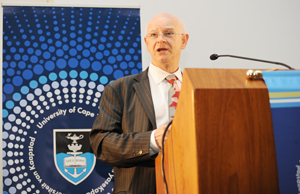Many answers to financial crisis blame game
04 April 2011 Greed or game: Sir Howard Davies delivered the recent Vice-Chancellor's Open Lecture and deliberated on who was to blame for the recent economic crisis. (For video footage go here)
Greed or game: Sir Howard Davies delivered the recent Vice-Chancellor's Open Lecture and deliberated on who was to blame for the recent economic crisis. (For video footage go here)
Video games, too much testosterone or human greed? These are just three of the many responses to the question posed by Sir Howard Davies at the recent Vice-Chancellor's Open Lecture: Who or what was responsible for the recent global economic crisis?
Sir Howard, the current director of the London School of Economics in the UK, answered this critical economic question in a number of ways.
Basing the lecture on his book The Financial Crisis - Who is to blame? Davies analysed some of the more likely answers and poked fun at some of the 'wild-card' theories on the 2007 to 2008 crisis - which many economists believe was the worst since the Great Depression of the 1930s.
The crisis resulted in a severe economic recession, which included the collapse of large financial institutions, government bailouts, and plummeting stock markets. This, in turn, led to evictions, business closures and a dramatic decline in consumer wealth.
"Everyone seems to be blaming someone different," said Davies. "In the UK people mostly blame bankers and those who took on more debt than they could afford. A more depressing figure is the 32% of American Democrats who put the blame for the crisis on 'the Jews'."
Davies explains that a "huge credit bubble" was created as banks, aware that less risk means less reward, lent people more and more money - despite a stagnant average monthly income. Through more available credit, people were able to finance an unrealistically high standard of living.
"Central banks looked like a driver going at the speed limit, but with the engines overheating and the wheels falling off," said Davies. "People were increasing their borrowing, but there was too little capital in the banking system - and the banks were allowed to continue operating under those conditions."
Davies argues that the lesson learnt here is that in the future, banks will need more capital to finance loans.
"Auditors were especially useless during that period," comments Davies. "They said that it was not their job to forecast the future, but if that was the case, what was the point of having them there in the first place?"
Davies acknowledges that there was probably a sizable amount of genuine fraud, although there is no evidence to support this.
"But there were things going on that are worse than fraud," noted Davies. "I think they actually believed they had created a money machine, so they were more guilty of naiveté than fraud. They thought that if something went wrong someone else would pick up the bill. In this case it was the taxpayer."
Davies also pointed the finger of blame at inefficient markets, incentives for traders that encouraged recklessness, and a capitalist system in which regulation couldn't prevent the crisis from deepening.
Then there what he dubbed the "wild-card" theories. The Archbishop of Canterbury, Dr Rowan Williams, blamed "human greed" for the crisis.
"But," comments Davies, "one person's greed is another person's earnest desire to do better for himself and his family."
Another theory is that it's a 'boy thing' - that a testosterone-driven market encourages risky behaviour.
"However, they also found that introducing more women to the trading floor simply increased testosterone levels in men!" quipped Davies.
"I think we are now half way through a programme of remedy," concluded Davies. "We may never know the extent of some of the contributory factors, such as video games, which I think are worthy of more research. And that's as good a way as any to end an academic lecture - with a call for more research."
Download podcast of the lecture.
View the video of the lecture.
View short interview with Davies after the lecture.
 This work is licensed under a Creative Commons Attribution-NoDerivatives 4.0 International License.
This work is licensed under a Creative Commons Attribution-NoDerivatives 4.0 International License.
Please view the republishing articles page for more information.










